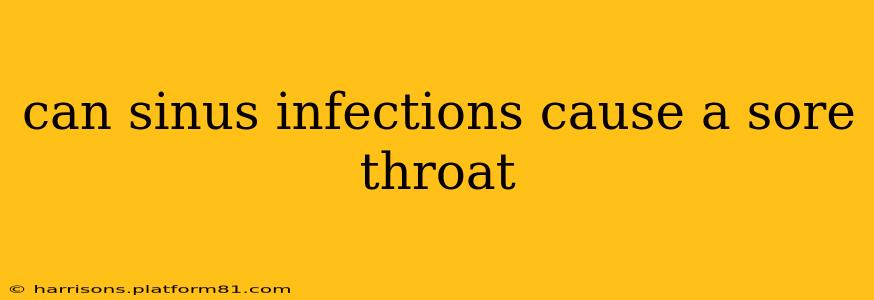Yes, sinus infections can absolutely cause a sore throat. While not always a primary symptom, a sore throat is a common complaint among individuals suffering from sinusitis (sinus infection). The connection lies in the close proximity of the sinuses and throat, and the way inflammation and drainage can spread. This article will explore the link between sinus infections and sore throats, addressing common questions and providing valuable insights into managing these related conditions.
How Does a Sinus Infection Lead to a Sore Throat?
The sinuses are air-filled cavities located behind your cheekbones, forehead, and between your eyes. When these become infected, inflamed, and filled with mucus, the resulting irritation can easily spread. Several mechanisms contribute to a sore throat during a sinus infection:
-
Postnasal Drip: This is the most common culprit. Excess mucus produced during a sinus infection drips down the back of the throat, irritating the delicate tissues and causing soreness, scratchiness, and even a cough. This constant irritation is a major contributor to the sore throat.
-
Inflammation: The inflammation caused by the sinus infection can extend beyond the sinuses themselves. The inflammation can spread to the throat, leading to swelling and pain.
-
Bacterial Spread: Although less common, in some cases, bacteria responsible for the sinus infection can also colonize the throat, leading to a secondary infection that exacerbates the sore throat.
What are the Symptoms of a Sinus Infection with a Sore Throat?
Recognizing the symptoms is crucial for seeking appropriate treatment. While a sore throat alone isn't diagnostic of a sinus infection, it, coupled with other symptoms, strongly suggests the possibility. Common symptoms include:
- Sore throat: Feeling of scratchiness, pain, or irritation in the throat.
- Nasal congestion: Stuffy nose, difficulty breathing through the nose.
- Facial pressure or pain: Pain or pressure in the cheeks, forehead, or between the eyes.
- Headache: Often a dull, persistent ache.
- Thick, colored mucus: Yellow or green mucus draining from the nose.
- Cough: Often a dry cough initially, possibly becoming productive with mucus.
- Fever: Although not always present, a fever can indicate a more severe infection.
- Fatigue: Feeling tired and weak.
Can a Sore Throat Be the Only Symptom of a Sinus Infection?
While less frequent, a sore throat can be the primary or seemingly only symptom of a sinus infection, particularly in cases of mild sinusitis or when postnasal drip is the dominant factor. However, it's essential to consider other factors and consult a healthcare professional for proper diagnosis and treatment. A sore throat alone may also indicate other conditions, making a proper diagnosis necessary.
How is a Sinus Infection with a Sore Throat Treated?
Treatment options usually depend on the severity of the infection and the underlying cause (viral, bacterial, or fungal). Common treatments include:
-
Over-the-counter medications: Pain relievers (like ibuprofen or acetaminophen) can help manage pain and fever. Decongestants can help relieve nasal congestion, but they should be used cautiously and for a limited time. Saline nasal sprays can help thin and clear mucus.
-
Prescription medications: If the infection is bacterial, antibiotics may be prescribed. Your doctor might also prescribe nasal corticosteroids to reduce inflammation.
-
Home remedies: Staying hydrated by drinking plenty of fluids, using a humidifier to add moisture to the air, and resting are helpful supportive measures. Warm compresses applied to the sinuses can provide temporary relief from pain.
Important Note: This information is for general knowledge and should not be considered medical advice. Always consult a healthcare professional for diagnosis and treatment of any medical condition. Self-treating can sometimes worsen the problem or delay appropriate medical intervention.
When Should I See a Doctor About a Sore Throat and Suspected Sinus Infection?
You should consult a doctor if:
- Your symptoms are severe or worsen despite home treatment.
- You have a high fever.
- You experience difficulty breathing.
- Your symptoms last longer than 10-14 days.
- You have other concerning symptoms, such as severe headache or facial pain.
By understanding the connection between sinus infections and sore throats, you can better manage your symptoms and seek appropriate medical attention when needed. Remember, early diagnosis and treatment are crucial for preventing complications and ensuring a speedy recovery.
